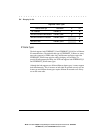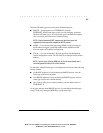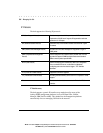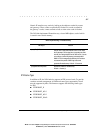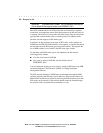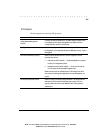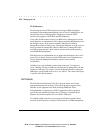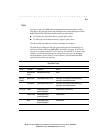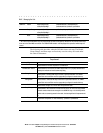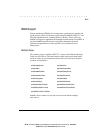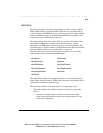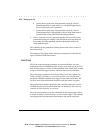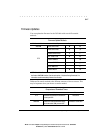
. . . . . . . . . . . . . . . . . . . . . . . . . . . . .
5-10
Managing the Hub
Writer:
Chris Seiter
Project:
Compaq Netelligent 2724/2824 Dual-Speed Hub User Guide
Comments:
File Name:
2824_5.DOC
Last Saved On:
06/25/97 5:32 PM
IPX Autodiscovery
The hub supports Novell IPX autodiscovery through its HMI-compliance
mechanism so that management platforms, such as Novell’s ManageWise, can
automatically discover managing hub. The protocols involved in IPX
autodiscovery support are SAP, RIP, and IPX Diagnostics.
Using SAP, the hub advertises that it is an HMI server (although not all of the
server functions are implemented). This registers the hub in the Binderies of all
the NetWare servers on the network segment. When Novell's NMS or
ManageWise initiates autodiscovery, it queries the Binderies of all the servers it
knows to obtain the internal IPX address of HMI servers. ManageWise then
uses RIP to obtain the hub’s MAC address and other information required to
start SNMP/IPX management.
IPX Diagnostics are implemented only to support the NetExplorer server. This
protocol is not directly involved with the IPX autodiscovery algorithm, but is
used to update the ManageWise database with the current network
configuration.
NetWare servers age out Bindery entries after 60 seconds. To remain in a
server’s Bindery and stay available for autodiscovery by ManageWise, the hub
broadcasts SAPs every 55 seconds. You can disable this feature by setting the
MIB object cpqnIpxSAPBcastStatus to no-ipx-SAPs(2). The value of this object
is stored in non-volatile memory.
SLIP Protocols
The 2824 hub uses SLIP (Serial Line IP) to provide remote, out-of-band
management through the serial port. The same IP protocols supported over
Ethernet are also supported over SLIP, including SNMP and Telnet.
IP fragmentation is supported over SLIP. Fragmentation allows the hub to
receive the same maximum IP packet size, 1520 bytes, for both SLIP and
Ethernet. The maximum packet size over SLIP is 1006 bytes.
To establish a SLIP connection, you must set the IP address and the subnet
mask for the SLIP interface, using the VT100 interface or SNMP management.





